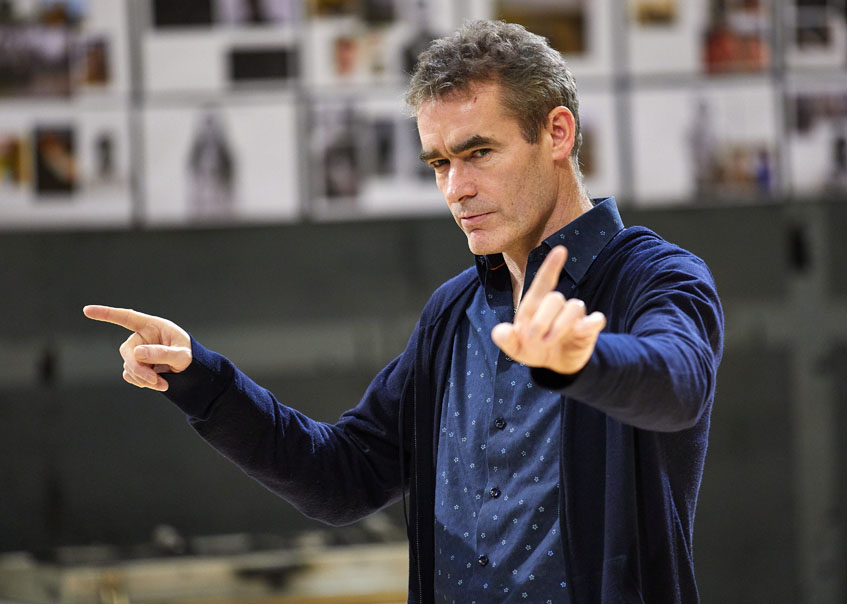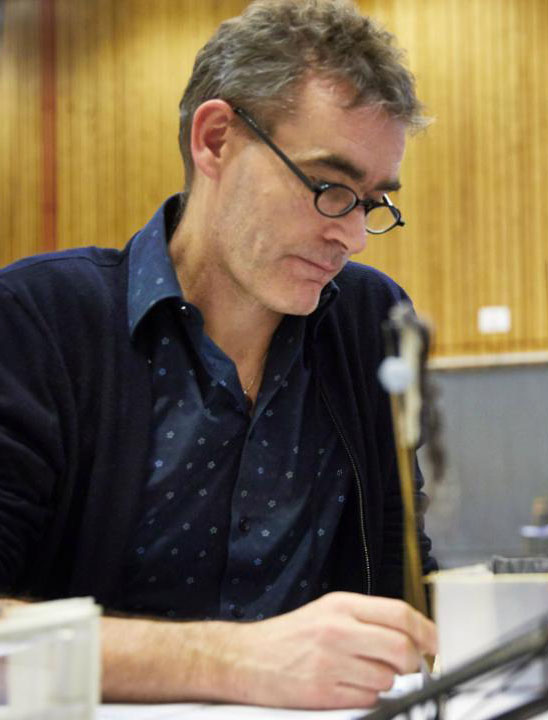
RUFUS NORRIS has been the Artistic Director of the National Theatre since 2015. His production of MACBETH is currently on tour. StageTalk Magazine’s GRAHAM WYLES spoke to him prior to the opening of the tour last November.
For someone who is running a major national institution, is a producer, a director, champion of theatre arts and diversity, award winning film director and for all I know makes his own tea and coffee at work, Rufus Norris is refreshingly unpackaged and approachable. There’s nothing glib about Mr. Norris. Ask him a question and you’ll get a considered answer, new-minted and to the point. He’s also not one to duck an awkward question.
We are chatting in the 1805 room of the Theatre Royal Bath where he has come to do the publicity prior to the national tour of his production of Macbeth, which, it has to be said, did not have the easiest of rides on its first run at the Olivier. I wonder if the tour offers an opportunity for him to change anything? Well yes, but not because of the less than enthusiastic reviews, after all, he points out, it did sell out for the run despite the critical attention. He is glad of the opportunity to have another look at it, not because of any major faults, but because the move out to a series of proscenium arch stages offers him the chance to re-think some of the more intimate scenes, the two-handers which are strung throughout the play and are not served particularly well by the vast landscape of the Olivier stage.
Notwithstanding the fact that Macbeth is on the national curriculum Rufus Norris is acutely aware that part of the National’s remit is to take its work out of the Southbank, particularly in a time when local arts budgets are being slashed. Shakespeare in particular is one of the cornerstones of the national culture and should be available to as wide and diverse a public as possible. The forthcoming tour starts at the end of September and will take in eighteen venues across the UK and the Republic of Ireland.
Unlike his predecessors he is not a university man, having graduated from RADA, and is confessedly not a fan of ‘table work’, preferring to get down to the business of rehearsal as soon as possible. Perhaps as a consequence, he acknowledges a slight bias towards actors who act from the heart rather than the head. You get the impression that whilst academics are welcome and are clearly useful in the preparatory stages, once the cast are in the rehearsal room the sooner the native spirits take over and the sooner the creative process can get going in earnest. That said he’s a great believer in the writer’s authority, for him the writer comes first. Even when doing a devised piece he will still use a dramaturg to make sure of that unifying vision. Unsurprisingly then, he is a champion of new writing and considers that about forty five percent of the National’s work is new work. Then he muses for a moment, recalculating to include living playwrights and guesses that it would work out at about fifty-fifty in terms of productions where the playwright would be in the room. I wonder, given his reputation for innovative work if he sees his role as primarily creating an experience or serving the text. I’m feeling a little flattered that he thinks the question worthy of some consideration when after a moment or two he plumps for the text.
He acknowledges that running a large organization like the National presents a challenge for someone who prefers to be hands on and down with the troops. He likes to be accessible and laughs when I relate the story about a group of NT actors during the reign of Peter Hall who wrote to Jim’ll Fix It asking; ‘Dear Jim can you fix it for us to meet Peter Hall?’ ‘The number of people you can know in an organization is about a hundred and twenty’, he tells me, ‘at the National there are over two thousand people a year moving through.’ To compensate to some degree he likes to make regular forays down from the fourth floor, not only to watch rehearsals, but to put his head round the door in all those other departments which are so essential to a high achieving organization like the National Theatre.
Choosing a play is of course a personal thing and for Norris it has to pass a couple of tests: ’Why me? That is why should I do it and why now, what is its current relevance?’ In Macbeth, the themes of ambition, leadership and loyalty, particularly during a time of upheaval and danger were ones that he thought would resonate with a contemporary audience. It’s not difficult to see why.
My ten minutes up, the National’s press secretary leans delicately in to call a halt. I could have done with another twenty minutes, but they were on a strict schedule and were off on the next train to Wolverhampton to do the whole process over again and spread the word that the National really is a national theatre. Graham Wyles July 2018
© Graham Wyles/StageTalk Magazine 2018. All rights reserved. No reproduction in part or in whole without prior permission.
Macbeth rehearsal photos by Brinkhoff Mögenburg


